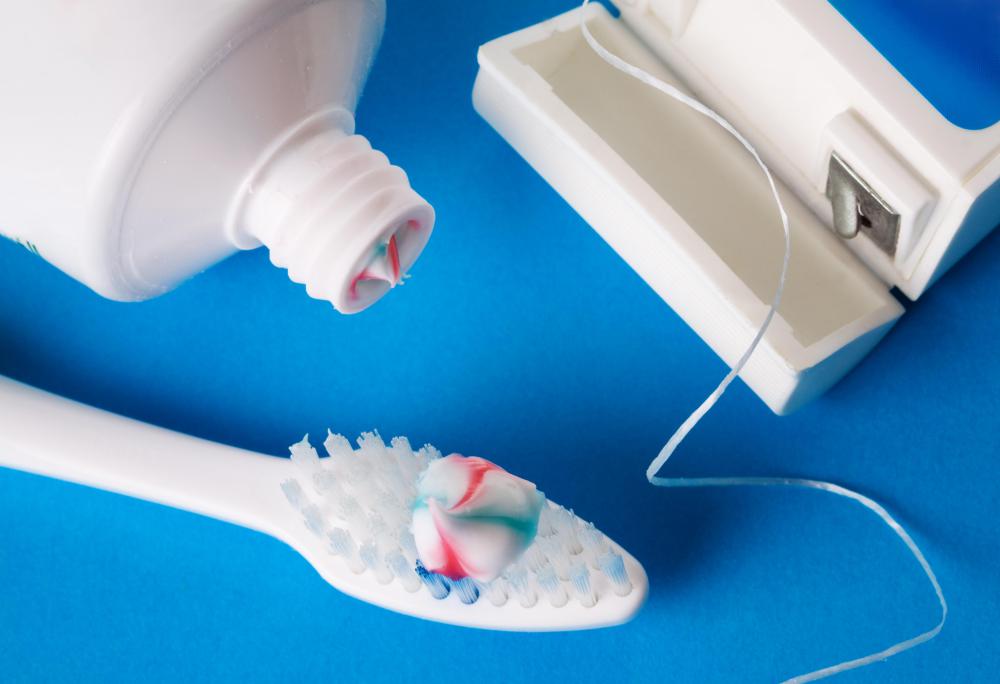At TheHealthBoard, we're committed to delivering accurate, trustworthy information. Our expert-authored content is rigorously fact-checked and sourced from credible authorities. Discover how we uphold the highest standards in providing you with reliable knowledge.
What is an Oral Prophylaxis?
Oral prophylaxis is a dental procedure that removes tartar and plaque build-up from the teeth through polishing and scaling. It is different from teeth bleaching procedures because its purpose is to stop tooth decay or other dental issues. Through the process, the dental hygienist normally cleans under the gums and the surface of the teeth. It is not considered to be an aesthetic procedure, and it is generally performed by an experienced dental hygienist or dentist. Some people with severe staining or other complications may be advised against using this procedure.
Special equipment called automatic scalers are often used to perform oral prophylaxis. Sonic scalers deliver water and compressed air through a hose into a handheld unit. The air pushes the water out in rapid cycle to clean the teeth and area below the gums. Ultrasonic scalers use energy waves to clean the build-up. Although they can be noisy, bulky, and rather expensive, the automatic scalers work to make the cleaning procedure shorter and more comfortable for the patient.

Some people choose to undergo this process because they are trying to fight tooth decay, gum disease, or staining. The procedure may also be recommended for someone getting braces or other orthodontic work. Since braces make it hard to clean the teeth and gums, many people believe that starting out with very clean teeth will make it easier to maintain them during the time the braces are worn.

Oral prophylaxis is not recommended as a substitute for brushing the teeth, flossing, and visiting the dentist on a regular basis. There are some at-home tools that can help people maintain their teeth and gums, as well. Electronic or sonic toothbrushes are generally inexpensive and can help keep plaque and tartar build-up to a minimum. An oral irrigator may also work to maintain the teeth and gums. Most drug stores and dental offices sell these products.

For most people, this type of teeth cleaning is considered a safe procedure. Myths that the teeth become loose after prophylaxis are largely unsubstantiated, but it is important that the procedure is completed by a licensed professional. In addition, patients should discuss any medical conditions they have with the dental professional before undergoing the procedure. Some automatic scalers can be dangerous to people who have pacemakers, for example.
People with dental insurance should check to make sure the procedure is covered because, if not, it can be quite an expense. Many insurance companies are hesitant to cover oral prophylaxis, especially if they think it is used for aesthetic purposes.
AS FEATURED ON:
AS FEATURED ON:















Discussion Comments
@indigomoth - That's why flossing is better than brushing your teeth. I've even heard a dentist say that toothpaste is not necessary at all, as it is the physical action of removing bacteria with the brush and the floss that is important, and a mouth wash will prevent them from growing back.
I can't wait until they finally manage to develop the bacteria that they have been promising for a long time, that will make teeth cleaning and dental hygiene a thing of the past altogether.
It's a type of bacteria which inhibits the bacteria which harm teeth, without harming you as well.
If they ever manage to develop it, you pretty much would get infected by the bacteria when you develop teeth and never have to worry about them again.
I have heard of people who become obsessed with oral hygiene, to the point where they manage to wear the enamel off their teeth.
This is one of the procedures people like that really love. Which is not to say that you shouldn't do it, but just remember that it is not a miracle cure for your teeth.
It is also worth remembering that enamel can be easily worn off the teeth if they are exposed to lots of abrasion. That's why you aren't supposed to brush your teeth directly after a meal, because the food can soften teeth a little bit which makes it easier to damage them.
Teeth don't ever become stronger through more intensive hygiene. They can only be preserved as much as possible with preventative measures.
Post your comments